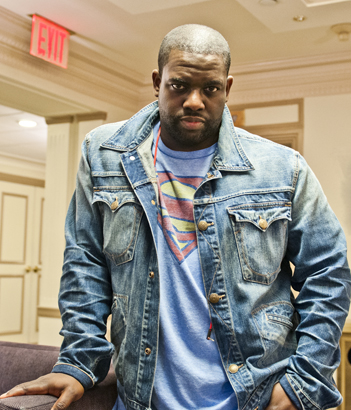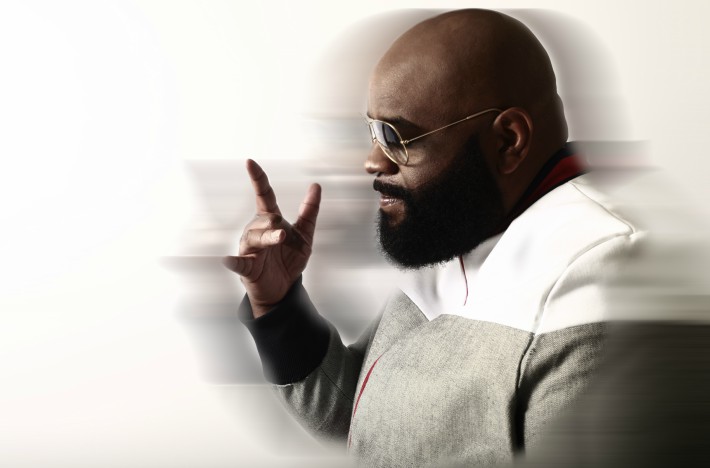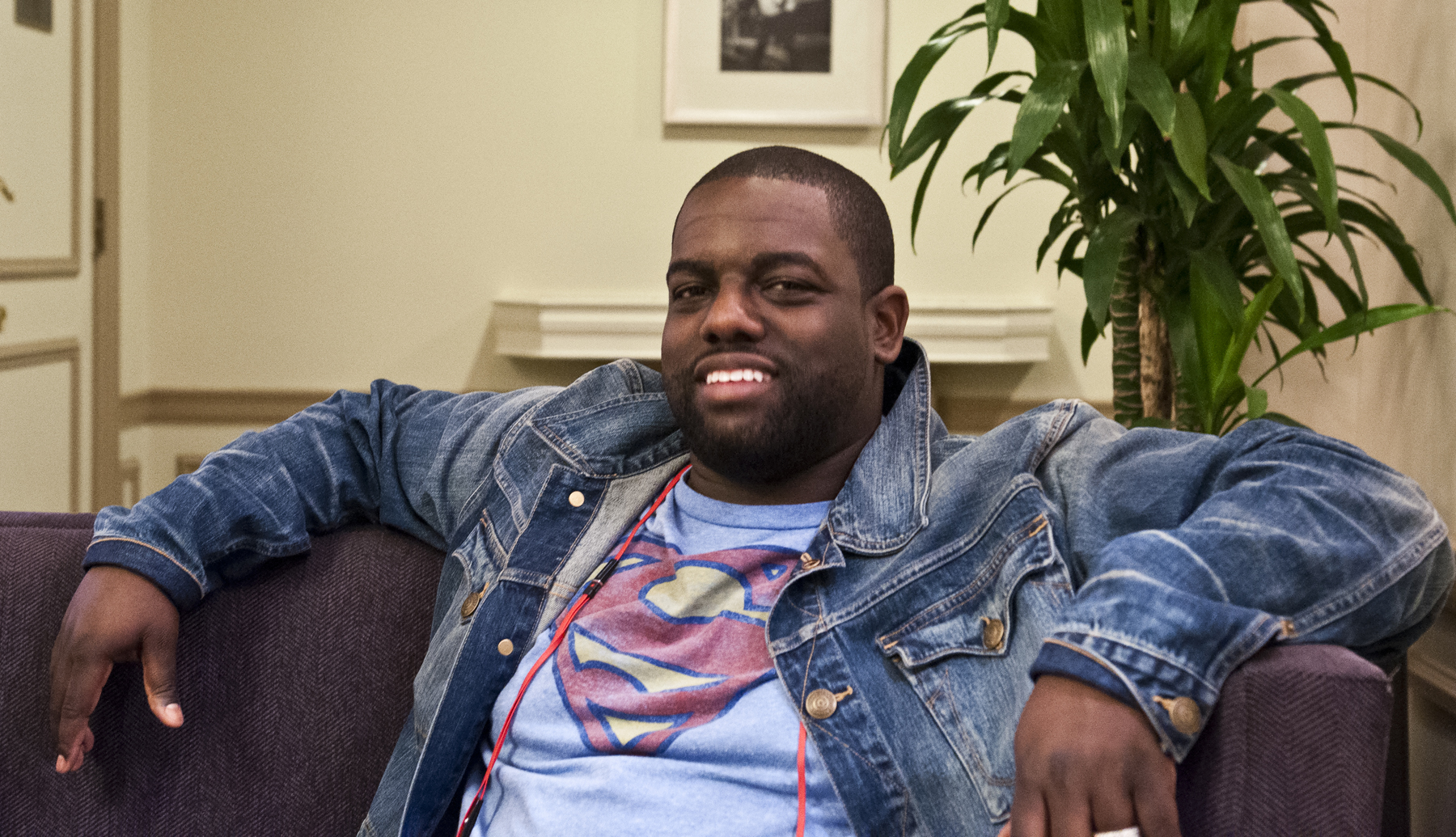If you’re a Mary Mary fan, you’ll instantly recognize his face as the husband of Erica Atkins-Campbell one-half of the platinum selling, Grammy winning duo, even moreso now after the success of their reality show. If you’re a fan of music like myself, and you still love ripping the plastic off the CD so you can read the credits than you’ll recognize his name from dozens of CD pamphlets. Producer, Warryn Campbell‘s discography reads like a urban entertainment Who’s-Who, including the seven Mary Mary albums he’s executive produced, but also featuring song writing and production credits for people like Alicia Keys, Yolanda Adams, Snoop Dogg, Beanie Sigel and soooo many more. We recently caught up with the industry heavyweight to talk about his journey from pastor’s son to production royalty, his development in the business and his work with Mary Mary. Join the conversation…
Parlé Magazine: One look at your discography and one can see that you’ve worked with everyone from Bebe Winans to Luther Vandross to Carl Thomas on “Summer Rain” to Kanye West and back to Mary Mary of course. Tell me, how does someone establish that type of career?
Warryn Campbell: I guess, you would have to 1. be true to the stuff you like to do. I don’t ever want to sort of stick to one genre, even in enjoying music and listening to music, I didn’t just listen to Hip-Hop records, I listened to everything; Gospel records, Hip-Hop records, R & B records, well not so much R & B, when I was a kid, I didn’t like R & B, I only liked Hip-Hop and Gospel, that was it, but I listened to Jazz, Classical, all that. So when I started making records, making songs, it was the same thing. I wanted to make everything. So I tried to place songs with Yolanda Adams, I would work with Tupac, and I’d say, let’s see if we can get a song with Luther Vandross, you know, trying to do stuff that I liked, and it kinda turned into a multi-genre career.
Parlé: You also had a short stint in a V.P. role with Elektra records, correct?
Warryn: The last couple of years before Elektra shut down, I was VP over there. Really it was sort of like school for me, because I knew how to make a record, but I didn’t know what happened after I made the record. I knew I wanted to start a record label though, so I told my manager at the time, J Brown, who is now the owner of Roc Nation, he was the Senior Vice President at Elektra, so I told him, ‘man I wanna work as A & R, get paid every two weeks like everybody else’. Cause at that point I had never had a job before in my life, not as a kid, McDonalds, nothing. So I told him I wanted to do that because I want to know what’s going on so I know how to work a label. He said aight. So I met with Sylvia Rhone and she hired me… as Vice President. I thought she was gonna hire me as somebody’s assistant, I don’t know what I expected, but she gave me a vice president position and really helped nurture me, and kinda shepherded me and I learned a lot about running a label. What to do, what not to do, those types of things. It was a great experience.
Parlé: One more tidbit that I just learned is that you used to work for Death Row, how’d that come about?
Warryn: Death Row was an awesome experience man, 1. because I believe that Death Row, especially in the early years created some of the most incredible music, ever. First of all you had Dr. Dre, probably one of the best producers–he’s the closest thing to Quincy Jones in our era that there is, I think. He was spearheading that label, creatively. Then you had Suge Knight who was this huge presence on the executive side, I learned a lot watching Dre make the records and watching Suge help break the records. It was amazing. I was a teenager, 17, 18, I was a session player. One of the producers would come in and do a drum beat, literally just a drum beat. I would come in and play the instruments behind it. I played bass, keyboard and all the little instruments on the record. I just learned how to make–not songs, but I learned how to put albums together. You listen to Dr. Dre’s first album, Snoop Dogg’s first album, the way those album’s were put together, sequenced, even the way DJ Quik, who was part of Death Row as well, he was my direct mentor, the way he put his album together. These are a lot of West Coast pioneers but they were incredible at making entire albums. And that’s what I wanted to do as opposed to just making a single or a hot record. I hone my skill at making a complete body of work. But it all started at Death Row.
Parlé: You grew up in church–
Warryn: Grew up in church, grew up in my father’s church. Playing, singing, acting a fool, doing what preacher’s kids do. Preacher’s kids are always the baddest kids in the church. I definitely was no exception. I love my upbringing, I love the church, still today, everywhere I go, you might find me at the weirdest church functions. They’ll be like, ‘what you doing here?’ ‘I just showed up, heard there was a church function.’ I love it! That’s how I learned how to do what I do as far as musically. Everything I learned to do as far as playing instruments and my sensibilities musically, came from church. And I love the environment.
Parlé: How’d that translate to Hip-Hop? I know for some Christians the genre represents the total opposite of what they believe in.
Warryn: I had a different pastor. And not only was he my pastor, but he was also my father. And he was young for a pastor. My dad, he just believed that music is music. He was a musician himself. He said, as long as it wasn’t crazy, and you know what I mean by crazy? Defiling women, and calling them out there names and stuff like that, crazy–he’d be okay with it. Party music and stuff like that were okay. We’d be on the way to church in the Summertime, I’d be in the truck with my dad and he’d throw on “Summer Time” trying to be cool, trying to bond with his son. Or he’ll put on LL Cool J. He let me listen to that stuff.
When I became interested in music, because when I was 16, I actually met Mario Winans and at that time Mario would not do any secular music, at all. So I was impressed by that. I thought he was the man–he was a couple years older than me, so I looked up to him a lot. He was like, ‘I don’t do no secular music, just Gospel.’ I was like, ‘oh yeah, me too!’ So I got home, trying to impress my dad, I told him, ‘Dad, I’m not ever going to do any secular music.’ My dad said, ‘Oh? Sit down, let me talk to you for a minute. You don’t type, you don’t take dictation, you don’t do construction, you’re not a dentist, you’re a musician, this is your occupation. You do what’s in your heart to do. If that’s what you want to do than do it. But I’ll tell you what, don’t let your occupation run all over your salvation. One has to be first.’
So that’s what I always tried to do. Now I don’t know if I held that up by going to Death Row Records (laughs). But at Death Row we were just making music. I didn’t know anything about the lyrics. We just made music during the day and then Tupac or somebody would come later on in the day. I didn’t know about the lyrics, I never heard it until the album came out most of the time, or til the album was getting ready to come out, we’d do a listening session and I’d be like, ‘oh wow, did he just say what I think he just said? I can’t put my name on that. My dad would kill me.’
Parlé: So your father sparked everything?
Warryn: It was really my dad that pushed me, and he was my father and my pastor so I didn’t really have any problems and I didn’t care what people said cause my dad said it was cool AND my pastor said it was cool. That’s how I was able to navigate when people would say, ‘you’re going to hell, you making that devil music!’
Listen, my Daddy said it was cool. I ain’t scared of ya’ll, I was scared of him.
Parlé: Shortly after the Death Row stint you hooked up with Mary Mary, helped get them that production deal. What was it about those two ladies that made you want to work with them?
Warryn: It was that pretty one with the dark hair (laughs). Yeah, the pretty one. I saw her at a play and actually Tina wasn’t there, but they were both in this play. I saw Erica, Tina was out sick, I don’t know. So Erica comes out, sings and does her thing, I was like ‘WOW.’ I was blown away, by her singing, by the way she looked as well. I didn’t want to step to her at the time because I was with another girl at the time and she was with me. So I came back, cause the play was there for two weeks. I introduced myself another day. I recognized them because they had like a million sisters and I would always see them around town, singing as a kid growing up. So I recognized her and thought, ‘that’s that girl with all the sisters.’ I introduced myself and that was that. I called her one day and they ended up coming to sing background on a song I was working on. That’s when I realized Tina could sing. So we started writing songs together and after we wrote one song, I thought, ‘this is pretty good.’ The very next song we wrote was “Shackles.” At that point, I said, ‘this could be amazing. You guys should try maybe doing a group.’ They looked at each other like, ‘Us?’ They were used to singing with their sisters but they didn’t sing together that much. But I think they were the only two in the family that wanted to sing professionally. So, after that, they thought about it and they thought it would be cool, so we made it work.
Parlé: What was the next step for the three of you from there?
Warryn: We started writing songs, and I said, we gotta come up with a name. The joke name was 2LC. There was TLC, but I called ’em 2LC for Two Light Skin Chicks (laughs).
I’m a fan of a lot of alternative Rock music, but I also loved the names, Eagle Eye Cherry, Third Eye Blind and stuff like that. They have some of the coolest band names. We were all going back and forth about names and I said, ‘what about Mary Mary?’ Cause I knew Mary was a very religious name. They were like ‘Mary Mary?’ I was like, ‘yeah, that would be dope.’ Tina was like, ‘Naw! What’s that?’
At the time, I wasn’t as well versed in the bible as I am now, so I didn’t know anything–I thought there were two Marys in the bible. We were in the basement of my parents house, so I was like, ‘hold on.’ I go upstairs and find my dad. I said, ‘Dad, is there 2 Marys in the bible?’
He was like, ‘Huh? What kind of question is that? Yeah! You ain’t learn nothing have you?’ He just went in on me.
I said, ‘Did they know each other?’
He rolled his eyes at me, he said, ‘Yeah, they were like sisters.’

I was like ‘Boom!’ Ran back downstairs like, ‘yeah, there was two of them, they knew each other, they were like sisters.’
They said, aight. And that was that!
Parlé: Did you anticipate the type of success that they’ve had in their career thus far?
Warryn: Yeah, cause I saw it. I saw them doing what they doing now and beyond. Their voices were HUGE and then looking at them, they’re both pretty girls, both attractive and they both have incredible personalities. So I thought, they could do movies and all that. I saw it. Now at the time I was 19, 20, something like that. So I didn’t know nothing about the business. I heard about signing an artist. So I thought I should sign them. Sign ’em to what? I don’t know. It was at that point that I started my company. My mother, she was working in corporate America, she quit her job to come set my company up and run my company for me. She set it up, and I signed the girls to my company. The first deal we were going to make was with Puff at Bad Boy. He was the first person that was interested. I told him, I got this Gospel group. He said, ‘Let me hear it.’ I played him “Shackles,” he jumped out his seat!
‘I’ma sign them right now, this is crazy!’ We didn’t end up signing with him, but he got the ball rolling, because Diddy wanted it, every other label wanted it. Just because he wanted it. That was a remarkable lesson, my first lesson in leverage and how this industry works. Because I sent it to a couple other labels before he wanted it and they were like, ‘it sounds good, but we don’t know what to do with this.’ After he wanted it, those same labels came back and wanted it. So because of that, we had a huge bidding war and we got a great deal, especially for a first time Gospel act. It was astronomical. That set the stage and the tone for their entire career. Everything was done on that level from that point on. It really pushed me too, their signed to my company now, but I had this other parent company, Columbia, so I had to perform and deliver. So it pushed me to really dig deeper on every album to get better and better and better. So now, its nothing for us to go in the studio and do an amazing album, cause that’s how we started. We started building that muscle, cause that’s what it is, its a muscle. They record, record, record, they may do 40 records, they may record 50 records. Sometimes when you hear they come out with a new song, they may have done that song 7 years ago. We just went down the catalogue, like I got these 40 records, we gotta put out an album, let’s pick the best 10. Let’s touch em up. We have good chemistry together, its fun, amazing.
Parlé: The entire time you’re working with Mary Mary, you’re still working with other artists. How is it balancing, first of all being a family man, executing producing the group albums and then doing your own thing?
Warryn: Well its not a hard balance, especially as a family man, because my wife does what I do. So it makes it that much easier when I have to be gone or at the studio because she understands, because when she’s working, she has to be gone. So its complete understanding. Sometimes they do get a little jealous, especially if I do a record with another artist and its blazing. But they understand the business.
Parlé: One last question, I know you were diagnosed with Kidney cancer back in 2008, is everything good in terms of health now?
Warryn: Everything is good, thanks for asking. I remember it like it was yesterday, I was diagnosed in April 2008 on a Friday. They caught it early and by the next Friday I was cancer free. Thank God.
In addition to being an amazing producer and the man behind Mary Mary, Warryn Campbell also runs his own label, My Block, Inc. The label is home to Mary Mary and his newest act, JoiStaRR. JoiStaRR is Campbell’s younger sister, but he promises that she can hold her own, with the Mary Mary duo or any other female artist in the game. Her debut album, Magic will be released this summer and her new single, “I’m Bleeding,” impacts radio in the coming weeks.
Warryn has one more pet project under his belt that he’s quietly proud about. He’s a member of a traditional Gospel Group, The Soul Seekers. The group allows him and some of the friends he grew up with and shared a love for music with, to take their talents and grow them. With the group he’s able to step from behind the boards and into the spotlight. Their self-titled debut album was a group effort released independently, but the response was somewhat overwhelming. The group earned a Stellar Award and several other accolades in their short time together.
 [INTERVIEW] Super Songwriter & Producer Big Shiz Opens Up A Career In Music & Forthcoming Debut EP
[INTERVIEW] Super Songwriter & Producer Big Shiz Opens Up A Career In Music & Forthcoming Debut EP
Producer, Educator & Published Author, Tony Dofat Has An Unstoppable Hustle
[INTERVIEW] Producer Travis Cherry – This Isn’t A Hustle, It’s A Career

